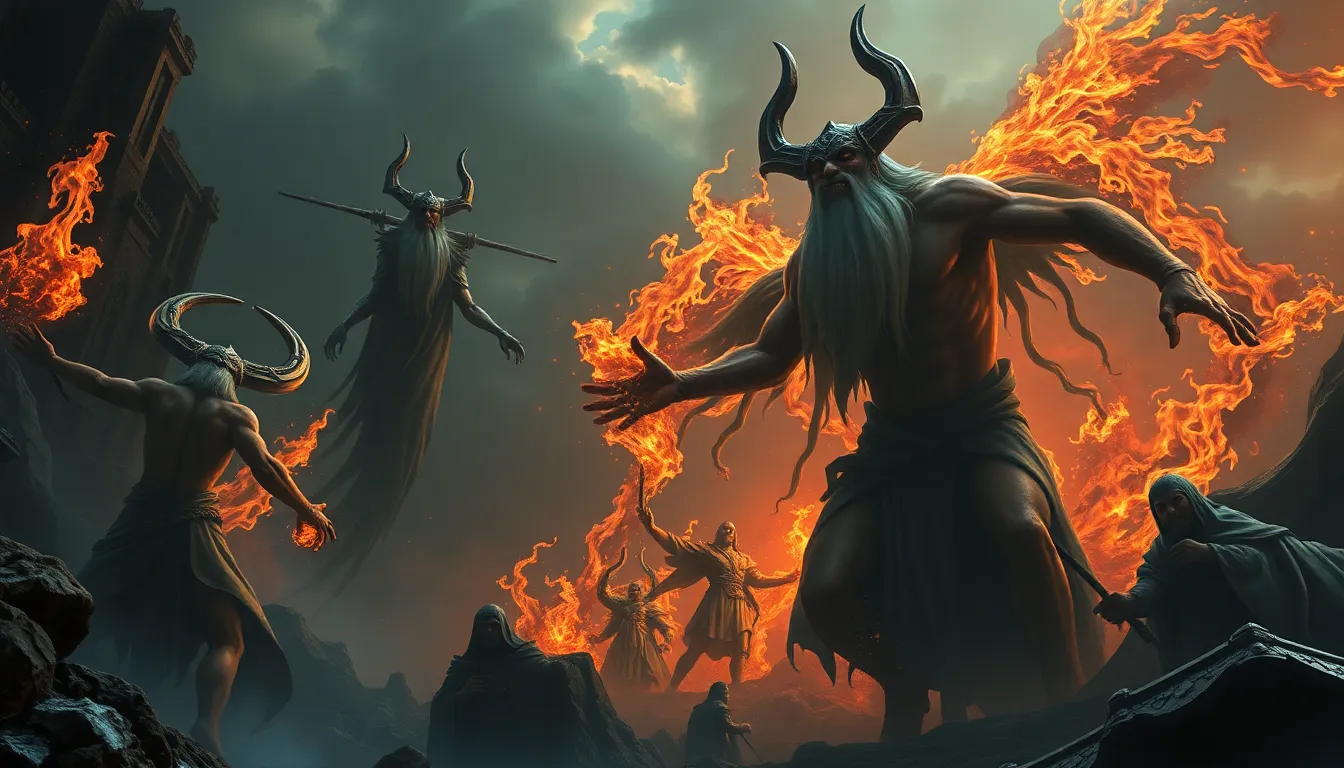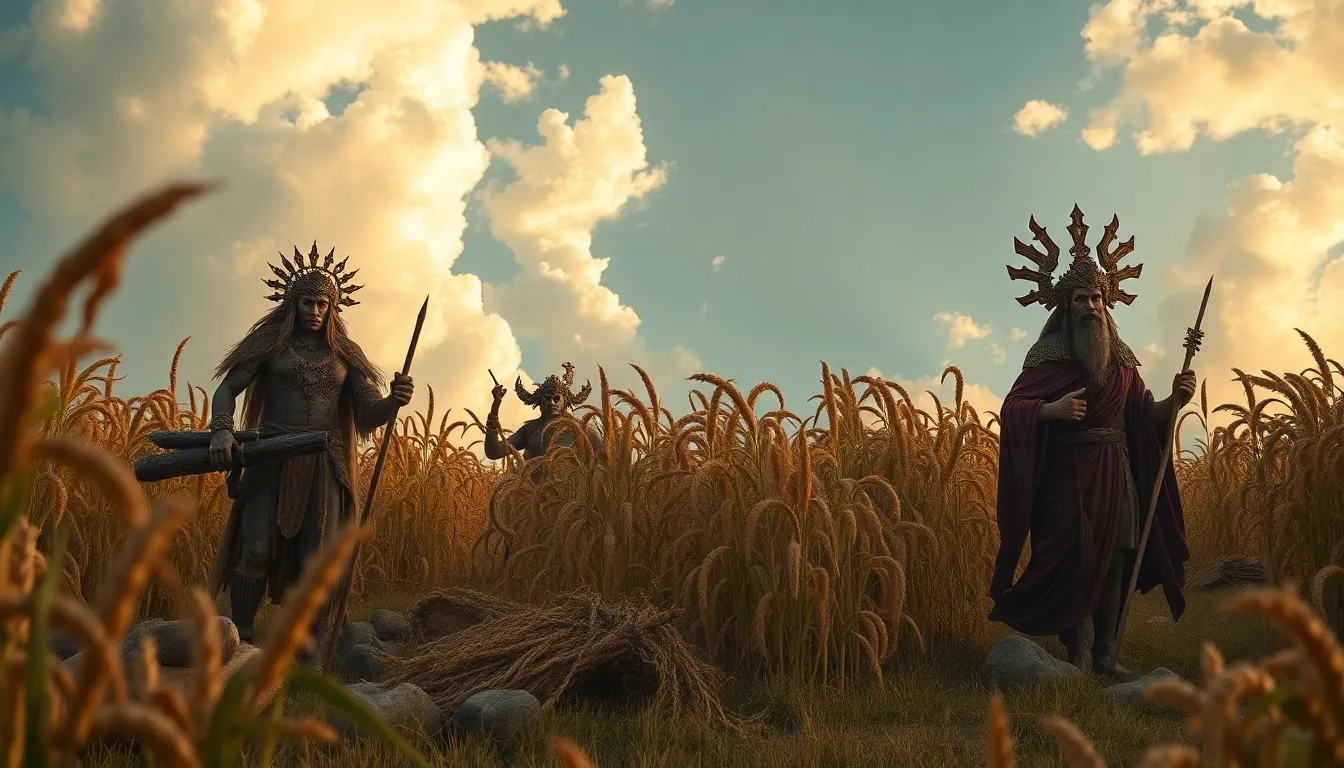Gods with a Grudge: The Most Notorious Divine Punishments
I. Introduction
Throughout history, mythology has served as a mirror to human nature, reflecting our desires, fears, and moral lessons through the actions of deities. Divine punishment, in particular, illustrates the consequences of defiance, hubris, and moral failure, highlighting the complex relationships between gods and humans. Exploring these narratives allows us to understand the significance of grudges held by deities, which often serve as cautionary tales about the importance of respecting divine authority and moral order.
This article will delve into various mythological traditions to uncover the most notorious divine punishments, illustrating how these stories have shaped cultural views on justice and retribution.
II. Ancient Greek Gods and Their Wrath
A. Zeus and the punishment of Prometheus
Prometheus, a titan known for his intelligence and for stealing fire from the gods to give to humanity, faced the wrath of Zeus. As punishment for his transgression, Zeus had Prometheus bound to a rock, where an eagle would eat his liver daily, only for it to regenerate overnight. This eternal torment symbolizes the consequences of defying divine authority and the eternal struggle between humanity and the gods.
B. Hera’s vengeance against Heracles
Hera, the queen of the gods, bore a deep grudge against Heracles, the son of her husband Zeus and a mortal woman. To punish him for his very existence, Hera sent serpents to kill him in his cradle and later drove him into madness, leading him to kill his own family. Heracles’ subsequent Twelve Labors were not only a means of atonement but also a testament to the relentless pursuit of vengeance by Hera.
C. Poseidon’s wrath on Odysseus and the journey home
Odysseus, the cunning hero of the Trojan War, incurred the wrath of Poseidon when he blinded the Cyclops Polyphemus, who was Poseidon’s son. In retaliation, Poseidon cursed Odysseus to wander the seas for years, facing numerous trials and tribulations before he could return home. This myth emphasizes the idea that the gods’ grudges can lead to prolonged suffering and a difficult path to redemption.
III. The Vengeful Deities of Norse Mythology
A. Loki and the fate of the gods after Ragnarok
Loki, the trickster god, is a central figure in Norse mythology, known for his cunning and deceit. His actions ultimately lead to Ragnarok, the end of the world, where many gods meet their demise. Loki’s betrayal of the gods and his subsequent punishment—bound by the entrails of his own children—illustrates the heavy price of treachery against divine kin.
B. Odin’s punishment of the giants
Odin, the Allfather, often clashed with the giants, whom he considered threats to the cosmos. His punishments, including the creation of storms and chaos, served as a reminder of the gods’ power to maintain order. The giants’ continual attempts to breach the walls of Asgard reflect the ongoing conflict between order and chaos.
C. Freyja’s retribution against those who wronged her
Freyja, the goddess of love and war, was known to take vengeance on those who wronged her, especially in matters of love. Her transformations and manipulations ensured that those who disrespected her faced dire consequences, often leading to battles or misfortunes in their lives, showcasing the theme of divine retribution in personal relationships.
IV. Egyptian Gods and the Consequences of Hubris
A. Ra’s curse on humanity
In ancient Egypt, Ra, the sun god, grew weary of humanity’s disobedience. In response, he sent the goddess Sekhmet to punish mortals with disease and destruction. Eventually, realizing the devastation caused by Sekhmet, Ra had to intervene, which reflects the delicate balance between divine power and mercy.
B. Set’s revenge against Osiris
Set, the god of chaos, sought revenge against his brother Osiris, ultimately killing him out of jealousy and ambition. His actions led to a cycle of death and rebirth, with Osiris becoming the god of the afterlife. This myth underscores the themes of betrayal and the consequences of familial rivalry among the gods.
C. Anubis and the judgment of souls
Anubis, the god of mummification and the afterlife, plays a crucial role in the judgment of souls. Those who led lives of hubris or wrongdoing faced the consequences of their actions in the afterlife, where Anubis weighed their hearts against the feather of Ma’at, the goddess of truth. This judgment reflects the moral order upheld by the gods, emphasizing the importance of living a righteous life.
V. Mesopotamian Myths of Retribution
A. The Epic of Gilgamesh and the wrath of the gods
The Epic of Gilgamesh portrays the relationship between humanity and the divine, showcasing how the gods respond to human arrogance. Gilgamesh, a king who sought immortality, faced divine retribution for his hubris when the gods sent the Bull of Heaven to punish him for his actions against the goddess Ishtar.
B. Ishtar’s vengeance against Gilgamesh
Ishtar, the goddess of love and war, sought revenge against Gilgamesh for rejecting her advances. Her wrath manifested in the form of the Bull of Heaven, leading to destruction in Uruk. This narrative illustrates the dangers of spurning divine affection and the severe consequences of disrespecting the gods.
C. Enlil’s punishment of humankind
Enlil, the god of wind and storms, became frustrated with humanity’s noise and chaos. In response, he unleashed a great flood to cleanse the earth, an act of divine punishment that parallels other flood myths across cultures. This story serves as a reminder of the gods’ authority and the need for humans to live in harmony with divine will.
VI. Hindu Deities and Their Cosmic Justice
A. Shiva’s destruction and renewal cycle
Shiva, the destroyer in the Hindu trinity, embodies the cyclical nature of creation and destruction. His dance of destruction paves the way for renewal, illustrating the duality of divine punishment and benevolence. This cycle teaches that destruction can lead to new beginnings, reflecting a deeper understanding of justice in the universe.
B. The curse of Durvasa
Durvasa, a sage known for his short temper, often cursed those who offended him. His curses usually led to significant hardships, demonstrating the potent consequences of disrespecting divine beings. These stories serve as moral lessons in humility and respect.
C. Vishnu’s avatars as punishments for evil
Vishnu, the preserver, takes on various avatars to restore cosmic order when evil prevails. Each avatar, from Rama to Krishna, serves as a divine response to human wrongdoing, emphasizing the belief that the gods actively intervene to maintain dharma (cosmic law and order).
VII. The Role of Divine Punishment in Indigenous Mythologies
A. The trickster gods and their lessons
In many indigenous mythologies, trickster gods like Coyote or Raven teach valuable lessons through their antics. Their actions often lead to unintended consequences, highlighting the importance of wisdom and caution in human behavior. These stories serve as moral guides for living in harmony with nature and society.
B. Punishments in Native American myths
Native American myths often feature punishments for those who disrupt the natural order. For instance, stories of individuals who disrespect nature or their community often end in tragic consequences, reinforcing the belief in living respectfully within the ecosystem.
C. African deities and the consequences of human actions
African mythology frequently emphasizes the relationship between human actions and divine retribution. Deities like Nyame or Anansi illustrate the consequences of greed, betrayal, and disrespect, serving as reminders of the moral fabric that binds communities together.
VIII. The Psychological and Moral Implications of Divine Punishment
A. Understanding human behavior through mythology
Divine punishment narratives provide insights into human psychology, illustrating how fear of retribution can influence behavior. These stories often serve as cautionary tales that reflect society’s values and moral expectations.
B. The impact of fear of divine retribution on culture
The fear of divine punishment has historically shaped cultural norms, laws, and ethical frameworks.


